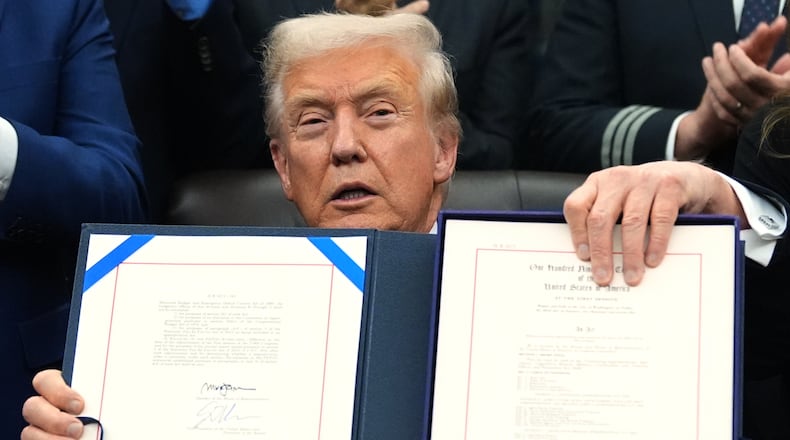All other funding is extended until the end of January, giving lawmakers more than two months to finish additional spending bills.
The Congressional Budget Office says that the negative impact on the economy will be mostly recovered once the shutdown ends, but not completely. The permanent economic loss is estimated at about $11 billion for a six-week shutdown, the Associated Press reported.
The fallout of the shutdown landed on millions of Americans, including federal workers who went without paychecks and airline passengers who had their trips delayed or canceled. Cincinnati and Northern Kentucky International Airport and the Dayton International Airport continued to see cancelations in the days following the end of the shutdown.
And still up in the air are payments from the Supplemental Nutrition Assistance Program, which stalled on Nov. 1 during the shutdown. Partial payments went out to Ohioans on Wednesday, with some local residents confirming with this news outlet that the allotment was roughly 65% what they typically receive.
SNAP has been the center of legal back-and-forth between the federal court system and the Trump administration for weeks, with lower courts ordering full payments go out to residents and the federal government bringing the issue to the U.S. Supreme Court.
impacting southwest Ohio:
• Intoxicating hemp: Ohio lawmakers say they’ll need to change course on the route to regulate intoxicating hemp in the state, following a provision in the federal budget bill that places new restrictions on hemp-derived products. The provision changes the legal definition of intoxicating hemp and would outright ban it on a federal level, industry advocates say.
• WPAFB project: The agreement to end the federal shutdown included a $30 million project at Wright-Patterson Air Force Base sought by both of Ohio’s senators and Rep. Mike Turner, R-Dayton. House-Senate negotiators agreed to spend $30 million on a Human Performance Center for the Air Force Research Laboratory as part of a measure funding construction projects for the military. The new lab building is intended to replace aging research facilities at WPAFB, which state lawmakers have described as “substandard.” It would house the Airman Systems Directorate of the Air Force Research Laboratory.
• Bernie Moreno: U.S. Sen. Bernie Moreno boasted that he had been checking Vehicle Identification Numbers on the cars used on Capitol Hill by Senate Democrats. The Ohio Republican said he was doing that to question the need for extra safety technology on new vehicles. But Moreno’s claim got under the skin of Democrats, who disliked the thought of one of their colleagues walking around Capitol Hill, peering in windshields, and writing down their VIN numbers.
Other federal updates:
• Presidential pardons: Trump has pardoned his former personal lawyer Rudy Giuliani, his onetime chief of staff Mark Meadows and others accused of backing Trump’s efforts to overturn the 2020 election. They come months after Trump’s sweeping grant of clemency to all 1,500-plus people charged in the Jan. 6, 2021, attack on the U.S. Capitol. The move underlines Trump’s efforts to promote the idea that the 2020 election was stolen from him, even though courts around the country and Trump’s own attorney general at the time found no evidence of fraud that could have affected the outcome.
• $2K checks: Trump recently teased a plan to send out $2,000 to Americans as a dividend linked to tariff revenue. But don’t expect a stimulus to be hitting your bank account anytime soon — that would likely need to be approved by Congress. Trump has not clarified who would qualify for the dividend, although he said “everyone,” except “high-income people,” would be paid at least $2,000. The announcement came amid the U.S. Supreme Court’s skepticism on the legality of the president’s use of emergency powers to levy import taxes on other nations.
• Epstein emails: Jeffrey Epstein wrote in a 2019 email to a journalist that Donald Trump “knew about the girls,” according to documents made public Wednesday. Democrats on the House Oversight Committee released three emails referencing Trump, including one Epstein wrote in 2011 in which he told confidant Ghislaine Maxwell that Trump had “spent hours” at Epstein’s house with a sex trafficking victim. The White House quickly accused Democrats of selectively leaking the emails to smear the president. The Republican businessman-turned-politician has consistently denied any knowledge of Epstein’s crimes and has said he ended their relationship years ago.
The Associated Press contributed to this report.
About the Author

